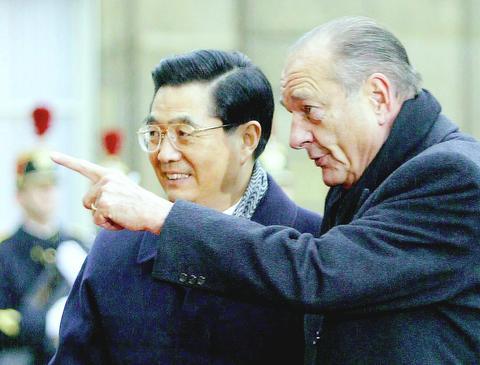France's president, in a strong show of support for the visiting leader of China, warned Taiwan that it will be committing a "grave error" that could destabilize the region by holding a referendum in March.
At a state dinner Monday to honor Chinese President Hu Jintao (胡錦濤), French President Jacques Chirac added his weight to China's opposition to President Chen Shui-bian's (陳水扁) plan to ask voters whether Taiwan should beef up anti-missile defenses if Beijing refuses to withdraw the hundreds of missiles it has pointed at Taiwan.

PHOTO: EPA
"Breaking the status quo with a unilateral destabilizing initiative, whatever it is, including a referendum, would favor division over unity," Chirac said. "It would be a grave error. It would carry a heavy responsibility."
Speaking later, Hu thanked Chirac for his "clear position of principle ... against the moves by the Taiwanese authorities that tend toward the independence of Taiwan through a referendum."
"We firmly oppose the independence of Taiwan and will not let anyone separate Taiwan from the rest of China in one way or another," Hu said.
But Chirac also pressed for human rights improvements in China, urging Hu to lead his country of 1.3 billion people "resolutely down the track of democracy and of liberties," to match its impressive economic transformation.
"Respect for human rights is a necessary condition for the development of modern societies and economies," Chirac said. "I know it is one of your priorities."
According the Chinese leader a rare honor, Chirac went himself to Paris' Orly airport to meet Hu and his wife, Liu Yongqing. The two men inspected a military guard as a band played China's anthem, March of the Volunteers, followed by France's Marseillaise.
Hu said closer ties between the two permanent members of the UN Security Council, who both opposed the US-led war in Iraq, would help promote "peace, stability and prosperity in the world."
Hu and Chirac discussed Iraq, Iran, the Middle East and Afghanistan, but not human rights, at a meeting Monday afternoon, Chirac spokeswoman Catherine Colonna said.
Chirac told Hu that France backs Chinese efforts to peacefully defuse tensions on the Korean peninsula stemming from North Korea's nuclear weapons program.
The state visit was Hu's first to Western Europe since he ascended to the presidency last March.
But human rights, a key concern in the country that spawned the declaration of the rights of man in 1789, overshadowed the official agenda. In protest at Chinese abuses, some lawmakers said they would boycott Hu's address to the French parliament yesterday.
"Nothing obliges us to listen to him who leads the world's biggest dictatorship," Lionnel Luca, a lawmaker from Chirac's UMP party, said on France-Info radio.
"China is not the smiling face it seems," he said.
Rather than hear Hu, Luca will join protesters against China's policies in Tibet at a demonstration scheduled to coincide with the speech, said Luca's parliamentary aide, Marie Huteau.

‘ABUSE OF POWER’: Lee Chun-yi allegedly used a Control Yuan vehicle to transport his dog to a pet grooming salon and take his wife to restaurants, media reports said Control Yuan Secretary-General Lee Chun-yi (李俊俋) resigned on Sunday night, admitting that he had misused a government vehicle, as reported by the media. Control Yuan Vice President Lee Hung-chun (李鴻鈞) yesterday apologized to the public over the issue. The watchdog body would follow up on similar accusations made by the Chinese Nationalist Party (KMT) and would investigate the alleged misuse of government vehicles by three other Control Yuan members: Su Li-chiung (蘇麗瓊), Lin Yu-jung (林郁容) and Wang Jung-chang (王榮璋), Lee Hung-chun said. Lee Chun-yi in a statement apologized for using a Control Yuan vehicle to transport his dog to a

BEIJING’S ‘PAWN’: ‘We, as Chinese, should never forget our roots, history, culture,’ Want Want Holdings general manager Tsai Wang-ting said at a summit in China The Mainland Affairs Council (MAC) yesterday condemned Want Want China Times Media Group (旺旺中時媒體集團) for making comments at the Cross-Strait Chinese Culture Summit that it said have damaged Taiwan’s sovereignty, adding that it would investigate if the group had colluded with China in the matter and contravened cross-strait regulations. The council issued a statement after Want Want Holdings (旺旺集團有限公司) general manager Tsai Wang-ting (蔡旺庭), the third son of the group’s founder, Tsai Eng-meng (蔡衍明), said at the summit last week that the group originated in “Chinese Taiwan,” and has developed and prospered in “the motherland.” “We, as Chinese, should never

‘A SURVIVAL QUESTION’: US officials have been urging the opposition KMT and TPP not to block defense spending, especially the special defense budget, an official said The US plans to ramp up weapons sales to Taiwan to a level exceeding US President Donald Trump’s first term as part of an effort to deter China as it intensifies military pressure on the nation, two US officials said on condition of anonymity. If US arms sales do accelerate, it could ease worries about the extent of Trump’s commitment to Taiwan. It would also add new friction to the tense US-China relationship. The officials said they expect US approvals for weapons sales to Taiwan over the next four years to surpass those in Trump’s first term, with one of them saying

INDO-PACIFIC REGION: Royal Navy ships exercise the right of freedom of navigation, including in the Taiwan Strait and South China Sea, the UK’s Tony Radakin told a summit Freedom of navigation in the Indo-Pacific region is as important as it is in the English Channel, British Chief of the Defence Staff Admiral Tony Radakin said at a summit in Singapore on Saturday. The remark came as the British Royal Navy’s flagship aircraft carrier, the HMS Prince of Wales, is on an eight-month deployment to the Indo-Pacific region as head of an international carrier strike group. “Upholding the UN Convention on the Law of the Sea, and with it, the principles of the freedom of navigation, in this part of the world matters to us just as it matters in the